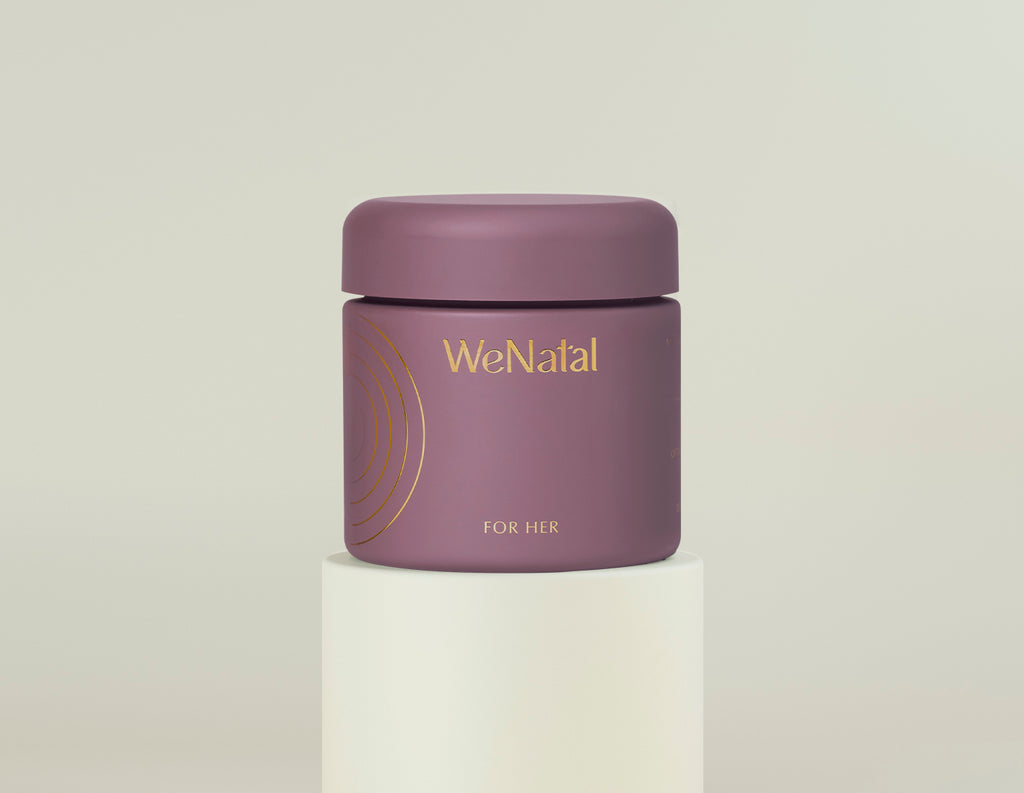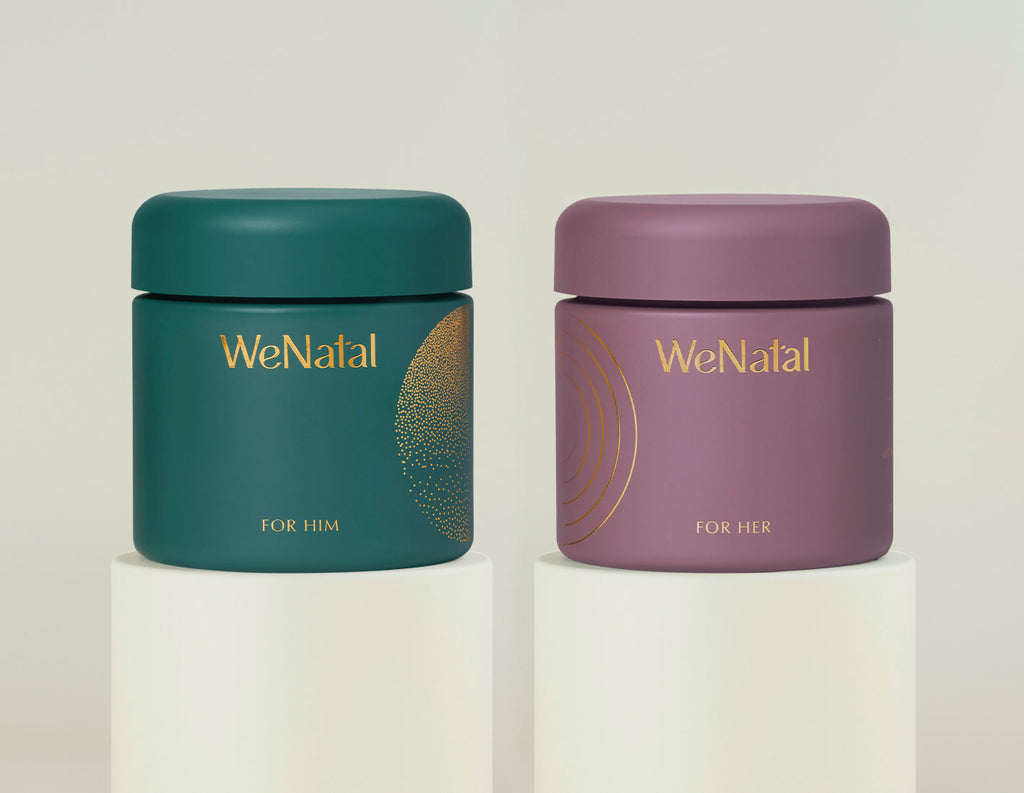
So you and your partner are talking babies! Sometimes it's hard to know where to begin when the conversation of starting a family comes up. When embarking on the journey of parenthood, couples often find themselves overwhelmed with advice, myths, and recommendations that can send mixed messages—so we're here to support you by staying focused on the information that matters.
Research shows fertility is influenced by numerous lifestyle factors, and many of these are within our control. By focusing on key areas such as mindset, supporting optimal nutrition and physical activity, as well as avoiding harmful environmental toxins, you and your partner can take meaningful action to optimize your chances of conception. Use this checklist to help you prioritize the steps that can lead to improved fertility outcomes.
WeNatal’s his and hers fertility checklist
1. Cultivate a positive mindset
Stress is one of the most overlooked factors in fertility and overall health. Chronic stress can disrupt hormonal balance, affecting ovulation in women and sperm production in men. Maintaining a positive mindset isn’t just about feeling good—it’s about fostering an environment where your body can thrive.
- Practice mindfulness and relaxation: Incorporate daily meditation, deep breathing exercises, journaling, or yoga to reduce stress levels.
- Support each other emotionally: Open communication is important. Share your thoughts, fears, and hopes with your partner to strengthen your emotional bond.
- Set realistic goals: Understand that the journey to conception may take time. Keep this in mind to avoid undue pressure.
- Seek professional help when needed: If stress or anxiety feels overwhelming, consider talking to a therapist or counselor who specializes in fertility or reproductive health.
2. Focus on nutrition for her and him
Nutrition plays a pivotal role in fertility for both men and women. A balanced diet rich in essential nutrients helps regulate hormones, improve egg quality, and boost sperm production.
For Her:
- Healthy fats: Include avocados, nuts, seeds, Omega-3 fatty acids, and olive oil to support hormone production.
- Folate-rich foods: Leafy greens, lentils, and eggs are essential for egg health and preventing neural tube defects in early pregnancy.
- Iron and high-quality protein: Lean meats, fish, eggs, and legumes improve ovulation and support uterine health.
- Antioxidants: Berries, citrus fruits, and vegetables like bell peppers fight oxidative stress, which can harm eggs.
For Him:
- Zinc and selenium: Found in oysters, pumpkin seeds, and Brazil nuts, these minerals enhance sperm quality and motility.
- Vitamin C and E: Citrus fruits, almonds, and sunflower seeds support healthy sperm production.
- Omega-3 fatty acids: Fatty fish like salmon, walnuts, and flaxseeds improve sperm count and morphology.
- High-quality Protein: Lean meats, low mercury fish, and plant-based sources like lentils boost testosterone levels.
3. Aim for proper supplementation
Even with the best diet, it’s often challenging to get every nutrient your body needs to support optimal fertility. WeNatal Together provides the highest quality supplements tailored for both men and women to support vitamin deficiencies and build the nutrient stores that are crucial to support fertility and healthy pregnancy development.
Key supplements for women:
- Prenatal vitamins: Choose a prenatal vitamin for women with adequate folate, iron, and iodine.
- Vitamin D: Supports ovulation and hormone balance; get tested for deficiencies.
- Coenzyme Q10 (CoQ10): Enhances egg quality, especially for women over 35.
Omega-3s: Helps reduce inflammation and supports hormonal health.
Key supplements for men:
- Zinc: Crucial for sperm production and testosterone levels.
- Coenzyme Q10 (CoQ10): Boosts sperm motility and morphology.
- Vitamin D and E: Essential for healthy sperm function.
- Folate: Enhances sperm DNA integrity.
Look for a targeted male prenatal vitamin that contains antioxidants and vitamins and minerals to help improve sperm quality. Before starting any new supplement, check in with your healthcare provider.
4. Stay consistent with daily movement
Exercise isn’t just about staying fit—it’s a fertility booster for both men and women. However, moderation can be key; over-exercising or too little exercise can negatively impact reproductive health.
For women:
- Focus on moderate intensity: Activities like brisk walking, swimming, or yoga improve blood flow to reproductive organs.
- Avoid overtraining: Excessive high-intensity workouts can disrupt ovulation.
- Incorporate strength training: Building muscle supports hormonal balance.
For men:
- Stay active: Regular exercise enhances testosterone levels and sperm quality.
- Avoid heat exposure: Activities like cycling or hot yoga should be limited as they can raise scrotal temperature, impairing sperm production.
- Include weight training: Resistance exercises promote overall health and boost energy levels.
Aim for 30-45 minutes of physical activity most days of the week to maintain optimal fertility.
5. Ditch plastics and known endocrine disruptors
Our environment plays a critical role in fertility. Many everyday products contain chemicals known as endocrine disruptors, which interfere with hormone function and can harm reproductive health.
Common sources of endocrine disruptors:
- Plastics: BPA and phthalates found in plastic containers and water bottles mimic estrogen, disrupting hormonal balance.
- Personal care products: Parabens and synthetic fragrances in lotions, shampoos, and cosmetics can affect reproductive hormones.
- Household cleaners: Many contain chemicals that interfere with the endocrine system.
Pesticides: Found in non-organic produce can affect both egg and sperm quality.
Tips to reduce exposure:
- Use glass or stainless-steel containers for food storage and water.
- Switch to natural or organic personal care products.
- Clean your home with non-toxic, eco-friendly products.
- Choose organic fruits and vegetables whenever possible.
- Avoid microwaving food in plastic containers.
Even small changes in your daily habits can significantly reduce exposure to these harmful chemicals.
Read more: Beyond the surface: endocrine disruptors and their impact on fertility
Track your progress together
The fertility journey is a team effort. Tracking your progress and supporting each other along the way can strengthen your bond while keeping you on course.
- For women: Use ovulation tracking apps or devices to monitor fertile windows.
- For men: Get a sperm analysis to understand baseline sperm health and address potential issues early.
Set joint goals: Whether it’s preparing meals together, exercising, or attending doctor’s appointments, collaboration is key.
A note from WeNatal: Building a fertility-friendly lifestyle
Optimizing fertility is about more than just conception—it's about creating a healthy foundation for your future family. By focusing on nourishing your body with optimal nutrients, maintaining an active lifestyle, and reducing exposure to harmful toxins, you can significantly enhance your chances of conceiving. We’re in this together!

WeNatal For Her

WeNatal For Him




